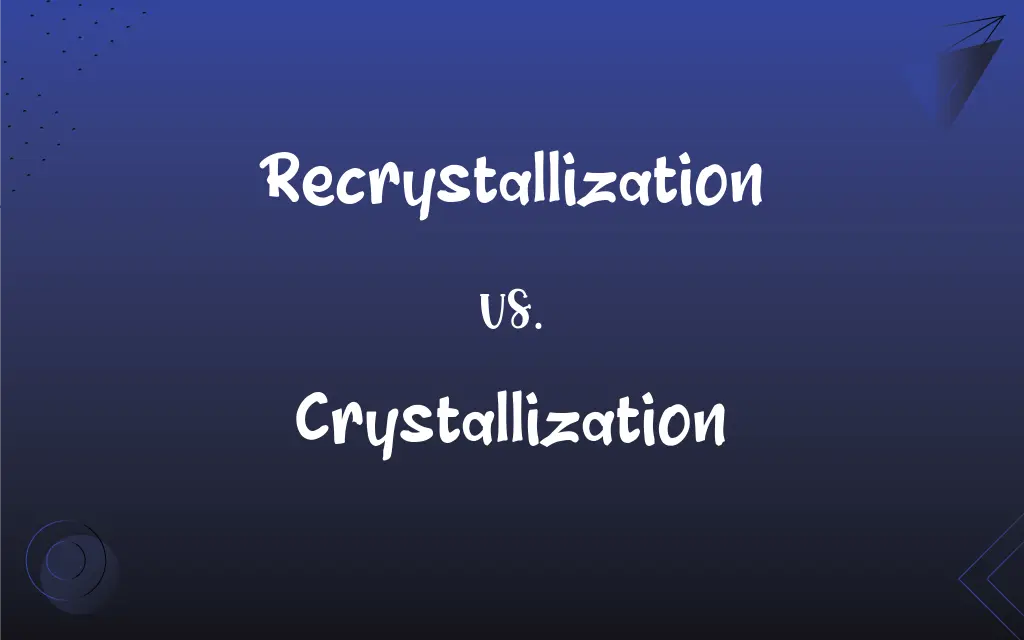Recrystallization vs. Crystallization: What's the Difference?
Edited by Janet White || By Harlon Moss || Updated on November 7, 2023
Recrystallization is the purification of these crystals by dissolving and re-forming them, while crystallization is the process of forming solid crystals from a solution or melt.

Key Differences
Crystallization refers to the process where a solid forms where the atoms or molecules are highly structured in a pattern known as a crystal. In contrast, recrystallization is a specific process used to purify a solid compound by dissolving it in a solvent at a high temperature and then cooling the solution to form crystals of the pure compound.
Crystallization can occur naturally, as minerals form from evaporating brine, or it can be a method in manufacturing, as with sugar from sugar beet or sugar cane. Recrystallization, however, is typically a laboratory technique where impurities are removed from a solid by utilizing differences in solubility at different temperatures.
In crystallization, the goal is to achieve a solid material with a specific geometric structure, which can be an end in itself or a step in a larger manufacturing process. In recrystallization, the objective is to improve the purity of the solid, which is already crystalline but may contain impurities.
One can see crystallization in the formation of ice from water or the solidification of wax as it cools. Recrystallization might be observed in a chemistry lab where a chemist recrystallizes a sample to obtain pure aspirin from a mixture that also contains impurities.
Crystallization is a critical step in many industrial processes and is key to the formation of many natural structures. Recrystallization, while also a crystallization process, is a technique primarily used in chemical purification to yield a more refined product.
ADVERTISEMENT
Comparison Chart
Word Type
Noun
Noun
Prefix
"Re-" indicates a repetition or process occurring again
No prefix, suggests an initial or standalone process
Suffix
"-tion" indicates the process or result of recrystallizing
"-tion" indicates the process or result of crystallizing
Word Origin
Derived by adding the prefix "re-" to "crystallization"
Derived from the word "crystal," which has roots in ancient Greek (krystallos)
Usage in Sentences
Often used to describe the purification process of a substance
Commonly used to describe the solidification process from a liquid or gas
ADVERTISEMENT
Connotation
Suggests refinement or improvement of a previous state
Implies the formation or coming into being of something new
Length
Longer due to the prefix "re-"
Shorter as it is the base word
Complexity
Slightly more complex because it implies a previous cycle
Simpler as it refers to the original process without prior context
Commonness
Less common in everyday language, more technical
More common, used in various contexts beyond the technical sphere
Recrystallization and Crystallization Definitions
Recrystallization
A technique to purify chemicals by dissolving and re-solidifying them.
The scientist improved the compound's purity through recrystallization.
Crystallization
The process of forming solid crystals from a liquid or gas.
Water's crystallization into ice occurs at zero degrees Celsius.
Recrystallization
The act of crystalizing again to enhance purity.
The salt underwent recrystallization to remove the contaminants.
Crystallization
The act or process of forming crystal.
The crystallization of rock candy from a supersaturated solution is a classic science experiment.
Recrystallization
A purification process for crystals from solution.
The pharmaceutical industry often uses recrystallization for drug purity.
Crystallization
A method of forming a crystalline structure in substances.
Silicon crystallization is fundamental in semiconductor manufacturing.
Recrystallization
A method to refine solids by exploiting solubility.
During recrystallization, the less soluble impurities were discarded.
Crystallization
The transition from chaos to a structured state.
The crystallization process of diamond from carbon requires extreme conditions.
Recrystallization
The process of forming a more perfect crystalline solid.
Recrystallization helped in obtaining better X-ray diffraction patterns.
Crystallization
The solidification of atoms or molecules into a highly structured form.
The crystallization of sugar from the syrup was fascinating to watch.
Recrystallization
(chemistry) a technique for the purification of chemical compounds in which the compound is dissolved in a solvent and slowly cooled to form crystals
Crystallization
To cause to form crystals or assume a crystalline structure.
Recrystallization
(geology) The process of existing grains in metamorphic rocks changing size.
Crystallization
To give a definite, precise, and usually permanent form to
The scientists finally crystallized their ideas about the role of the protein.
Recrystallization
(metallurgy) the growth of grain fragments in an alloy, especially when it is worked by cold rolling
Crystallization
To coat with crystals, as of sugar.
Recrystallization
The process or recrystallizing.
FAQs
What substances can crystallize?
Salts, sugars, minerals, and some proteins can crystallize under the right conditions.
Can impurities be removed by crystallization?
Yes, crystallization can exclude impurities as the crystal lattice forms.
What is crystallization?
Crystallization is the process of formation of solid crystals from a homogeneous phase.
Why is recrystallization important?
It's important for obtaining pure substances in chemistry and pharmaceuticals.
How are recrystallization and crystallization different?
Crystallization forms a crystalline structure, while recrystallization purifies an existing solid.
Can recrystallization be used for any solid?
Recrystallization is best for solids with impurities that have different solubility.
What factors affect crystallization?
Temperature, concentration, and purity of the substance affect crystallization.
Does recrystallization require a solvent?
Yes, a suitable solvent is necessary for the solid to dissolve and recrystallize.
Is crystallization a physical or chemical change?
It's a physical change where the matter changes its state but not its chemical identity.
What is recrystallization?
It's a process used to purify a solid compound by dissolving and reforming its crystals.
How do you choose a solvent for recrystallization?
The solvent should dissolve the compound when hot but not when cold.
Can crystallization be reversed?
Yes, by melting the crystal or dissolving it in a solvent.
What is the role of crystallization in manufacturing?
It's used to solidify products and separate them from impurities.
Is recrystallization always successful?
Success depends on proper control of temperature and solvent purity.
Can crystallization occur in nature?
Yes, crystals form naturally in environments like caves or evaporating water bodies.
What is seed crystallization?
It's a technique to initiate crystallization by introducing a 'seed' crystal.
Why is slow cooling important in recrystallization?
Slow cooling allows for the formation of purer and larger crystals.
What is the main goal of recrystallization?
The main goal is to obtain pure compounds for research and industry.
Are there different types of crystallization?
Yes, including evaporation, cooling, and precipitation crystallization.
How does recrystallization affect yield?
It can lower yield due to loss of some material during purification.
About Author
Written by
Harlon MossHarlon is a seasoned quality moderator and accomplished content writer for Difference Wiki. An alumnus of the prestigious University of California, he earned his degree in Computer Science. Leveraging his academic background, Harlon brings a meticulous and informed perspective to his work, ensuring content accuracy and excellence.
Edited by
Janet WhiteJanet White has been an esteemed writer and blogger for Difference Wiki. Holding a Master's degree in Science and Medical Journalism from the prestigious Boston University, she has consistently demonstrated her expertise and passion for her field. When she's not immersed in her work, Janet relishes her time exercising, delving into a good book, and cherishing moments with friends and family.
































































